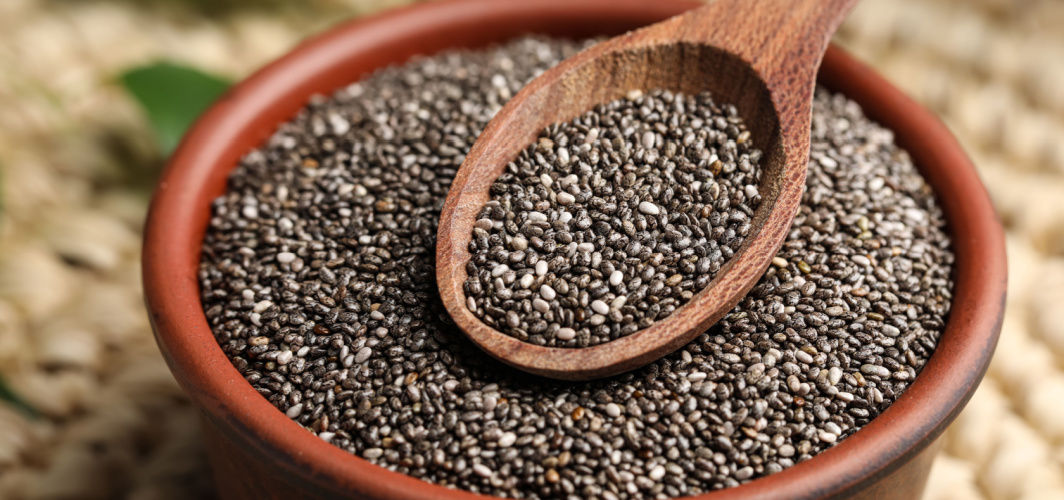General Health
All You Need To Know About Chia Seeds
10 min read
By Apollo Pharmacy, Published on - 28 September 2023, Updated on - 09 October 2023
Share this article
0
0 like

Chia seeds have a rich history of consumption dating back to 3500 BC, prominently consumed by ancient civilizations, especially the Mayans and Aztecs of Central America. In contemporary times, these small yet nutritional seeds are known for their high nutritional value and a multitude of health benefits.
Chia seeds also have a unique ability to absorb liquid, forming a gel-like substance. Owing to this property, chia seeds can be used in cooking and baking as a substitute for eggs or as a thickening agent. They are also rich in various micronutrients and help alleviate issues related to the gut and immunity.
In this comprehensive guide, we delve into the origins, health benefits, nutritional value, daily consumption recommendations, and considerations for integrating chia seeds into one's diet. Additionally, we examine potential side effects, offer precautions for safe consumption, and discuss their interaction with certain medications.
What are Chia Seeds?
Chia seeds originate from the Salvia hispanica plant, a plant from the mint family. Chia seeds have been extensively consumed since 3500 BC, and records indicate that they were grown as a cash crop in central Mexico between 1500 and 900 BC.
Ancient civilizations like the Mayans and Aztecs considered these tiny seeds a must-have for their numerous health benefits. The word "chia" is derived from the Mayan word for strength. Chia seeds were a staple food for Aztec warriors and messengers due to their high nutrient content and ability to provide sustained energy.
Today, chia seeds have gained popularity worldwide, thanks to their impressive nutritional content. They are packed with nutrients like fibre, protein, healthy fats, vitamins, minerals, and antioxidants.
Chia seeds are popularly used in smoothies and desserts like puddings because of their tendency to form a gel-like consistency when exposed to water. This versatile ingredient is considered a superfood for many reasons. Let's explore more about its positive effects on our health.
Health Benefits of Chia Seeds
Here's how chia seeds are beneficial for our health:
1. Lowers risks of heart disease
Adding chia seeds to your diet can support a healthy heart and cardiovascular system. Chia seeds are rich in omega-3 fatty acids, which are essential for heart health. Consuming omega-3 fatty acids has been linked to a reduced risk of heart disease, as they help lower blood pressure and inflammation in the body.
2. Blood sugar management
Chia seeds contain high levels of soluble fibre, which can help slow down the digestion process and prevent sudden spikes in blood sugar levels. This makes them an excellent addition to a diabetic or pre-diabetic diet.
3. Weight management
Chia seeds are often considered a weight loss aid due to their high fibre content. When consumed, chia seeds expand in the stomach, creating a feeling of fullness and reducing appetite. Additionally, their low-calorie content makes them an ideal addition to a weight-loss-focused diet.
4. Reduced free radicals
Chia seeds are loaded with antioxidants, which help protect the body against free radicals, i.e. unstable molecules that can cause cell damage and contribute to chronic diseases such as cancer. Including chia seeds in your daily diet can help boost your body's natural defences against oxidative stress.
5. Improved bone health
Chia seeds are an excellent source of calcium, magnesium, and phosphorus – all essential minerals for maintaining healthy bones. Incorporating chia seeds into your meals can support bone strength and help prevent conditions such as osteoporosis.
6. Reduced inflammation
Chronic inflammation is a root cause of many health problems, including heart disease, diabetes, and arthritis. Chia seeds contain omega-3 fatty acids and antioxidants that have anti-inflammatory properties. Adding chia seeds to your diet helps reduce inflammation in the body and promotes overall well-being.
Nutritional Value of Chia Seeds
Chia seeds are valued as a nutrient-rich food item because they are packed with several essential nutrients that play a crucial role in maintaining overall health. Here are some of the key nutrients found in chia seeds:
- Calcium: Chia seeds are an excellent source of calcium, which is essential for strong bones and teeth.
- Manganese: These seeds are also rich in manganese, an important mineral that helps regulate metabolism and support bone health.
- Magnesium: Chia seeds are a great source of magnesium, which is involved in numerous biochemical reactions in the body, including energy production and muscle function.
- Selenium: Selenium is a powerful antioxidant that helps protect cells from damage caused by free radicals. Chia seeds contain selenium, which contributes to overall health.
- Copper: Chia seeds provide a good amount of copper, an essential trace mineral that plays a role in the production of red blood cells and collagen.
- Iron: Iron is crucial for the production of haemoglobin, which carries oxygen throughout the body. Chia seeds are a plant-based source of iron.
- Phosphorus: Chia seeds contain phosphorus, which is essential for healthy bones and teeth as well as energy production.
- Omega-3 & Omega-6 fatty acids: The standout nutrient in chia seeds is omega-3 fatty acids. These healthy fats play a vital role in brain function, heart health, and inflammation reduction in the body. Chia seeds also contain omega-6 fatty acids, which are important for proper growth and development.
Nutrient Content Per Serving
Here is a breakdown of the nutrient content per serving of chia seeds (approximately 100 g):
|
Nutrient/Energy |
Content* |
|
Calorie |
486 |
|
Protein |
16.5 g |
|
Fat (both omega-3 and omega-6 fatty acids) |
30.7 g |
|
Carbohydrates |
42.1 g |
|
Fibre |
34.4 g |
|
Calcium |
631 mg |
|
Iron |
7.72 mg |
|
Magnesium |
335 mg |
|
Phosphorus |
860 mg |
|
Sodium |
16 mg |
*Note: these are approximate values
How Much Chia Seeds Should I Consume Every Day?
The recommended daily intake of chia seeds for adults is around 1-2 tablespoons (about 15-30 g). This amount provides a good balance of essential nutrients without going overboard. However, it's important to note that individual needs may vary based on factors such as age, weight, and specific health conditions. For young teenagers or children (aged 8 years or above), a smaller amount, such as 1 teaspoon (around 5 grams), may be more appropriate.
Who Should and Should Not Consume Chia Seeds?
Below is a specified list of who should and should not consume chia seeds:
1. People Who Should Consume Chia Seeds
- Healthy individuals: Chia seeds are generally safe for consumption by healthy individuals with no underlying health conditions.
- Vegans and vegetarians: Chia seeds are an excellent plant-based source of omega-3 fatty acids, which are typically found in fish. They are also rich in protein and fibre, making them a valuable addition to a vegan or vegetarian diet.
- Diabetics: Chia seeds can lower the glycaemic index of food items reducing your risk of metabolic syndrome and type 2 diabetes. Hence, chia seeds do not cause a rapid spike in blood sugar levels which makes them a suitable option for individuals with diabetes.
2. People Who Should Avoid Chia Seeds
- People with allergy or sensitivity: Some individuals may have an allergic reaction or sensitivity to chia seeds. If you experience symptoms such as hives, itching, or difficulty breathing after consuming chia seeds, it is best to avoid them.
- People with a history of digestive issues: Chia seeds absorb liquid and expand in the stomach, which may cause digestive discomfort for some people. If you have a history of digestive issues, such as irritable bowel syndrome (IBS) or diverticulitis (inflammation in your diverticula, small pockets that run through the colon wall), it is advisable to consult a doctor before incorporating chia seeds into your diet.
How to Consume Chia Seeds?
Here are different ways to include chia seeds in your diet:
1. Chia Pudding
Soak chia seeds in your choice of milk (dairy or plant-based) for a few hours or overnight until they absorb the liquid and become gelatinous. You can also add flavours like vanilla extract, cocoa powder, or fruits to create a delicious and nutritious chia pudding. It can be enjoyed as breakfast or as a dessert. For example, coconut chia pudding with mango chunks is a popular dessert.
2. Chia Smoothie
Blend chia seeds into your favourite smoothie for an added nutritional boost. The seeds will thicken the smoothie slightly and provide extra fibre and protein.
3. Chia Jam
Make a healthier version of jam by mixing mashed fruits with chia seeds. As the mixture sits, the chia seeds will absorb the liquid and create a thick spreadable consistency. This way, you can enjoy the sweetness of jam with no added sugars often found in store-bought varieties.
4. Chia Sprinkles
Sprinkle chia seeds on top of yoghurt, oatmeal, salads, or roasted vegetables for added crunch and nutritional value.
Remember to start with small amounts of chia seeds if you are new to consuming them and gradually increase the intake. Drink plenty of water throughout the day since chia seeds absorb liquid and can cause discomfort if you are dehydrated.
Side Effects of Chia Seeds
While most superfoods with good nutritional value are considered beneficial for the general population, such ingredients are also extremely potent. Chia Seeds may cause adverse effects, which are minor in most cases:
- Upset stomach: Consuming chia seeds in large quantities without proper hydration can lead to an upset stomach. Since chia seeds absorb liquid and expand in the stomach, it can cause bloating, gas, and abdominal discomfort for some people.
- Allergic reactions: Some individuals may be allergic to chia seeds. Symptoms of an allergic reaction can range from mild to severe and may include hives, itching, swelling of the face or throat, difficulty in breathing, and even anaphylaxis in severe cases.
- Blood thinning: Chia seeds contain omega-3 fatty acids, which can prevent blood clot formation. While this is generally beneficial for heart health, individuals taking blood-thinning medications should exercise caution and consult their doctor before consuming chia seeds in large quantities.
- Low blood pressure: In very rare cases, chia seeds may lower blood pressure due to their high omega-3 content. While this can be beneficial for those with hypertension, individuals with low blood pressure should monitor their levels and adjust their intake accordingly.
- Gastrointestinal issues: Some individuals may experience constipation or diarrhoea after consuming chia seeds. This can be due to the high fibre content of chia seeds.
Precautions to Take While Consuming Chia Seeds
When it comes to incorporating chia seeds into your diet, there are a few precautions you should keep in mind to ensure your safety and maximise the health benefits.
- Start with small quantities: If you're new to chia seeds, it is best to start with a small quantity and gradually increase your intake. This will allow your body to adjust to the high fibre content and prevent any digestive discomfort.
- Stay hydrated: Chia seeds absorb water and help promote a feeling of fullness. Thus, it is important to drink plenty of water throughout the day to prevent dehydration.
- Soak the seeds before consumption: If you have IBS or other digestive issues, soaking chia seeds in water or other liquids can make them easier to digest. This also helps prevent any potential choking hazards, as soaked chia seeds will not expand as much.
- Be mindful of allergies: Although rare, some individuals may be allergic to chia seeds. If you have a known allergy to other seeds, consult with your doctor before adding chia seeds to your diet.
- Avoid continuous intake: The best way to incorporate any new food item into your diet is to space out your intake. You can start by taking chia seeds twice every week, and then gradually increase the frequency of intake to alternate days and eventually every day. This will not only help your body acclimatise to a new food item but will also help you notice early signs of adverse reactions or discomfort.
Chia Seeds and Medications
Did you know that chia seeds can interact with certain medications? It is crucial to understand these interactions to ensure your health and safety. Here, we explain how chia seeds may react with common medications:
1. Diabetes Medications
Chia seeds are high in fibre, which can slow down the absorption of sugars from food. If you take diabetes medications that lower your blood sugar levels, consuming chia seeds may further reduce them, leading to hypoglycaemia. Regular monitoring of blood sugar levels is essential in such cases.
2. Blood Pressure Medications
Chia seeds contain potassium, which can lower blood pressure. While this may be beneficial for individuals with hypertension, it can result in low blood pressure when combined with certain blood pressure medications. Consult your doctor to adjust your medication dosage accordingly.
Remember, it's always wise to consult your doctor before making any drastic alterations to your diet or medication regimen. They will provide personalised guidance based on your specific health needs.
General Health
Leave Comment
Recommended for you

General Health
Pale Skin To Brittle Nails: Know The Signs Of Low Iron In Your Blood
Low iron content in the blood is a common issue faced by many adults and children. It is often due to a variety of causes, like an improper diet or poor absorption of iron from food.

General Health
Here’s The Difference Between Adenovirus, H3N2 Virus And COVID-19 Infection
In recent times, India has seen a massive spike in the number of H3N2 virus, adenovirus, and COVID-19 infections. Many people find it difficult to differentiate between these three viral infections. So, here is all you need to know about how to distinguish them based on their symptoms, causes, diagnosis, treatment, and prevention.
.jpg?tr=q-80)
General Health
What Does The CBC Test Mean?
A Complete Blood Count is a blood test used to diagnose various diseases. A CBC test report provides details of levels and characteristics of different blood cells, to help diagnose conditions like anaemia, infections, and blood cancers. Read on to learn more about CBC test uses and its procedure.
Subscribe
Sign up for our free Health Library Daily Newsletter
Get doctor-approved health tips, news, and more.
Visual Stories

Could There Be More to Your Snore?
Tap to continue exploring
Recommended for you

General Health
Pale Skin To Brittle Nails: Know The Signs Of Low Iron In Your Blood
Low iron content in the blood is a common issue faced by many adults and children. It is often due to a variety of causes, like an improper diet or poor absorption of iron from food.

General Health
Here’s The Difference Between Adenovirus, H3N2 Virus And COVID-19 Infection
In recent times, India has seen a massive spike in the number of H3N2 virus, adenovirus, and COVID-19 infections. Many people find it difficult to differentiate between these three viral infections. So, here is all you need to know about how to distinguish them based on their symptoms, causes, diagnosis, treatment, and prevention.
.jpg?tr=q-80)
General Health
What Does The CBC Test Mean?
A Complete Blood Count is a blood test used to diagnose various diseases. A CBC test report provides details of levels and characteristics of different blood cells, to help diagnose conditions like anaemia, infections, and blood cancers. Read on to learn more about CBC test uses and its procedure.